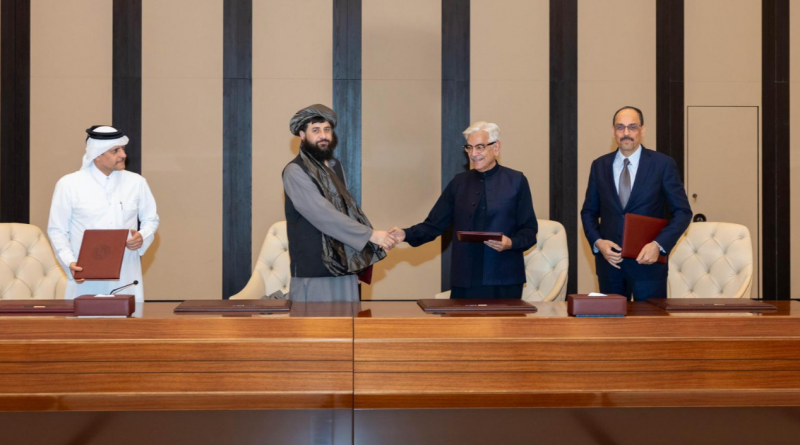Afghanistan, Pakistan Reach Ceasefire Deal in Qatar- and Türkiye-Led Talks
Doha — Afghanistan and Pakistan have agreed to an immediate cease-fire after a week of deadly clashes along their disputed 2,600 km (1,600-mile) border, following mediation efforts by Qatar and Türkiye.
According to a statement from Qatar’s Ministry of Foreign Affairs early Sunday, the two South Asian nations committed not only to a halt in hostilities but also to “the establishment of mechanisms to consolidate lasting peace and stability between the two countries”.
They further affirmed that follow-up meetings will be held in the coming days “to ensure the sustainability of the cease-fire and verify its implementation in a reliable and sustainable manner”.
Pakistan’s Deputy Prime Minister and Foreign Minister, Ishaq Dar, welcomed the accord as “a first step in the right direction”.
Posting on X, he expressed appreciation for the “constructive role played by brotherly Qatar and Türkiye”. He also flagged the next meeting to be hosted by Türkiye, underlining the need for “a concrete and verifiable monitoring mechanism … to address the menace of terrorism emanating from Afghan soil towards Pakistan”.
He added: “It is important to put all efforts in place to prevent any further loss of lives.”
Earlier, both Islamabad and Kabul held talks in Doha on Saturday after the worst violence between the neighbours since the Taliban takeover of Afghanistan in 2021.
According to Afghan government spokesperson Zabihullah Mujahid, negotiations took place in Doha with Kabul’s team led by Defence Minister Mullah Muhammad Yaqoob. Meanwhile Pakistan’s Ministry of Foreign Affairs confirmed its Defence Minister Khawaja Muhammad Asif led discussions with Taliban leadership.
The cross-border flare-up was triggered by Pakistan’s demand that Afghanistan rein in insurgent groups accused of staging increasingly frequent attacks on Pakistani territory—and which Islamabad says operate from safe havens inside Afghan soil.
The Taliban government denies harbouring armed groups for attacks on Pakistan, instead accusing Islamabad of misinformation, and of sheltering ISIL-linked militants undermining Afghan sovereignty.
On Friday, a suicide bomb near the border killed seven Pakistani soldiers and wounded 13 others, according to security officials. Pakistan’s Army Chief, Asim Munir, warned on Saturday that “the Afghan regime must rein in the proxies who have sanctuaries in Afghanistan and are using Afghan soil to perpetrate heinous attacks inside Pakistan.”
While the cease-fire agreement marks a positive step, analysts caution that the true test will lie in sustained verification, cross-border monitoring and addressing deep-rooted mistrust. Establishing a credible mechanism to monitor adherence and respond promptly to violations will be crucial if peace is to hold.



